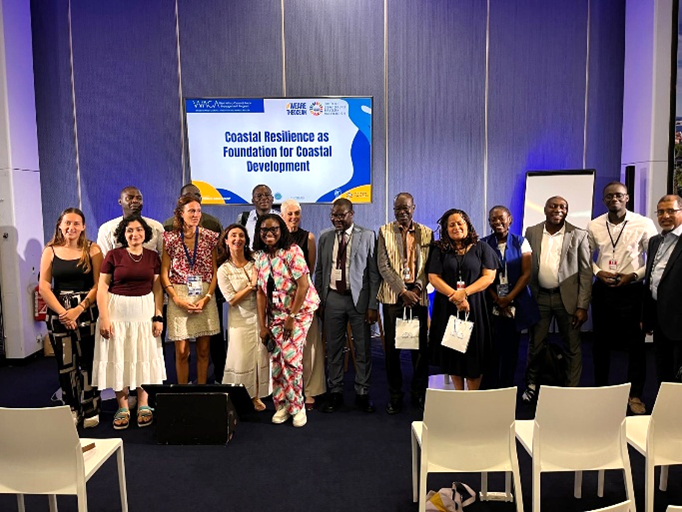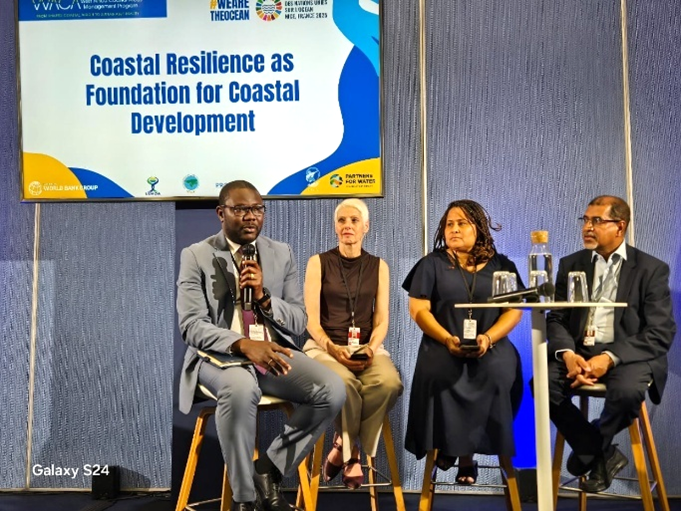News |
UNOC 3: WACA Puts Coastal Resilience at the Forefront of Sustainable Coastal Development in West Africa
On the occasion of the Third United Nations Ocean Conference (UNOC 3), the West Africa Coastal Areas Management Program (WACA) organized a side event on June 13 in Nice under the theme: “Coastal Resilience as the Foundation of Coastal Development.”
A high-level panel brought together representatives from regional organizations, national institutes, and technical and financial partners to share their experiences and perspectives. Below are the main takeaways from this rich and constructive exchange:
Regional coordination and integration are key levers to making the coastline a true driver of growth
Mr. Christophe Deguenon, Director of Environment and Water Resources at UEMOA, stressed that regional coordination has been one of the keys to progress achieved in recent years.
He highlighted the efforts made in harmonizing coastal zone management frameworks, developing joint guidelines, and providing technical support for physical and social investments in countries with the backing of regional partners such as IUCN, the Abidjan Convention Secretariat, CSE, PRCM, and RAMPAO.
A solid foundation has thus been consolidated, allowing WACA to go beyond resilience alone and become a real engine for strengthening economic integration, creating jobs, and enhancing regional competitiveness.
Valuing local solutions and fostering dialogue among stakeholders enables collective innovation for inclusive and sustainable coastal development
Mr. Ahmed Senhoury, Executive Director of the Regional Partnership for Coastal and Marine Areas (PRCM), recalled the essential role of communities in building resilience: mangrove restoration, community early warning systems, and the promotion of alternative livelihoods—efforts supported through grants financed by various donors.
He emphasized that the PRCM Regional Marine and Coastal Forum has become a key platform for dialogue among coastal and marine stakeholders in the region, fostering the emergence of various initiatives. He also invited participants to the next edition of the Forum, to be held in Mauritania in 2026.
Strengthening national capacities is crucial to ensure sustainable management of coastlines and sensitive ecosystems
Ms. Aissa Regalla De Barros, Director of the Institute for Biodiversity and Protected Marine Areas of Guinea-Bissau (IBAP), noted that WACA’s support has already enabled the training of teams on key themes such as natural world heritage, nature-based solutions, communication, and more—thus contributing to the empowerment of national actors and the sustainability of investments.
“Thanks to this support, the Bijagos Islands are now inscribed on the UNESCO World Heritage List,” she added.
Adapting international expertise can spur innovation and new economic opportunities
Ms. Liliane Geerling, Program Coordinator of Partners for Water (Netherlands), highlighted how Dutch experience, shaped by decades of coastal risk adaptation and integrated water management, can play a key role within the WACA partnership.
She explained that international cooperation, by encouraging joint innovation and skills transfer, strengthens local expertise and creates opportunities for local businesses.
This WACA side event reflected a shared conviction: protecting the coastline is not only about preserving the environment; it is also about investing in regional integration, growth, and the future of West African populations.

